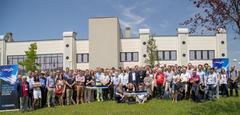URL: https://www.desy.de/news/news_search/index_eng.html
Breadcrumb Navigation
DESY News: EuPRAXIA kick-off meeting in Pisa
News
News from the DESY research centre
EuPRAXIA kick-off meeting in Pisa
The EU project EuPRAXIA (European Plasma Research Accelerator with eXcellence in Applications) is gathering pace. At a workshop in Pisa, Italy, particle accelerator experts from all over the world met with experts working in the field of novel laser accelerators, to discuss the design of a new, innovative European plasma accelerator, which is to be built in the context of EuPRAXIA and the EuroNNAc project. “New ideas and inventions have opened up possibilities for ground-breaking new accelerators. The EuPRAXIA consortium brings together the necessary expertise from Europe, Japan, China and the US, to build a dream machine like this in Europe and to demonstrate its benefits,” explains Ralph Aßmann, a scientist at DESY who is coordinating the EuPRAXIA project.

Participants of the EuPRAXIA workshop in Pisa.
The scientific workshop with over 120 participants, which went from 29 June until 1 July, took place at a venue that is steeped in history, especially for accelerator physicists: in 1589, the Italian scientist Galileo Galilei performed his seminal experiments on acceleration in Pisa. Using the very limited means at his disposal, such as his own pulse for measuring time, he discovered that the distance travelled by balls rolling down an incline was proportional to the square of the time. “At the time, Galileo revolutionised classical physics and discovered facts that are taught to school children all over the world today,” says Aßmann. “With EuPRAXIA we are setting out, together with our European and international partners, to realise revolutionary particle accelerators.”



